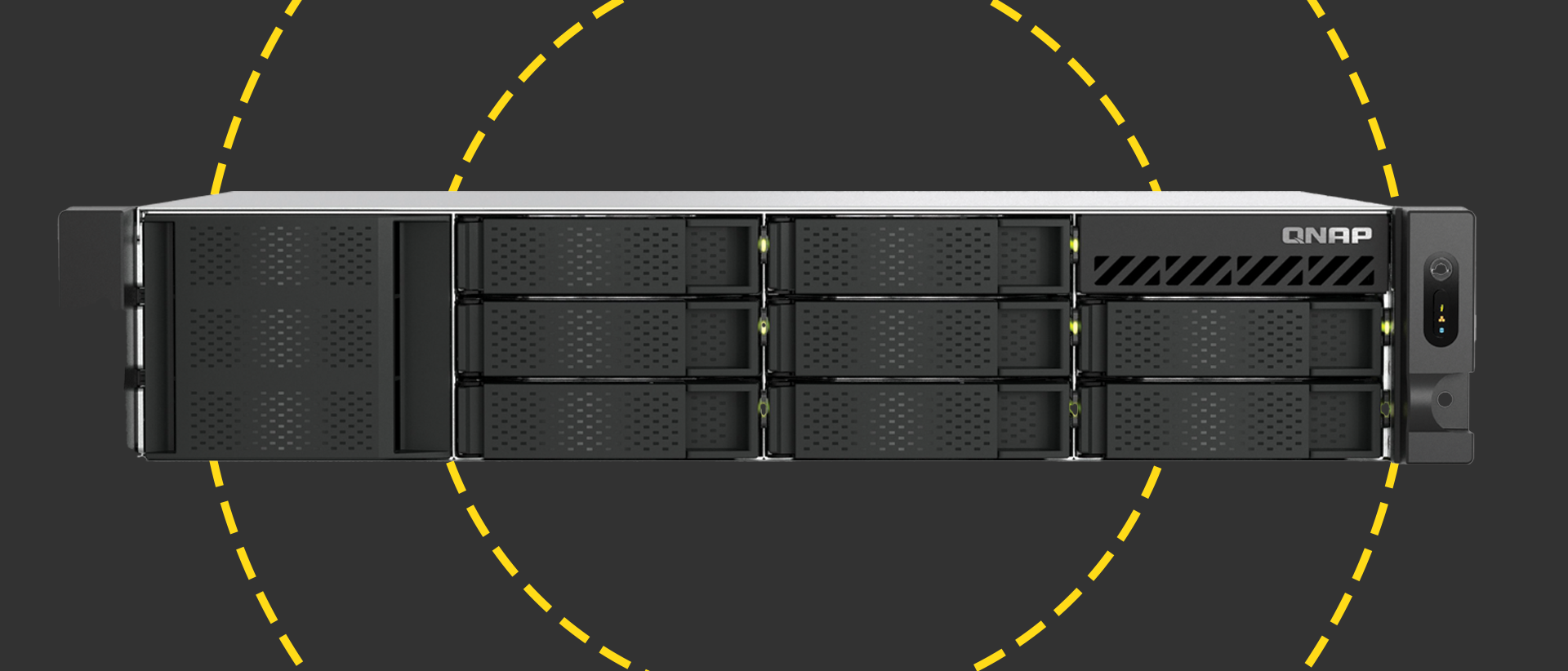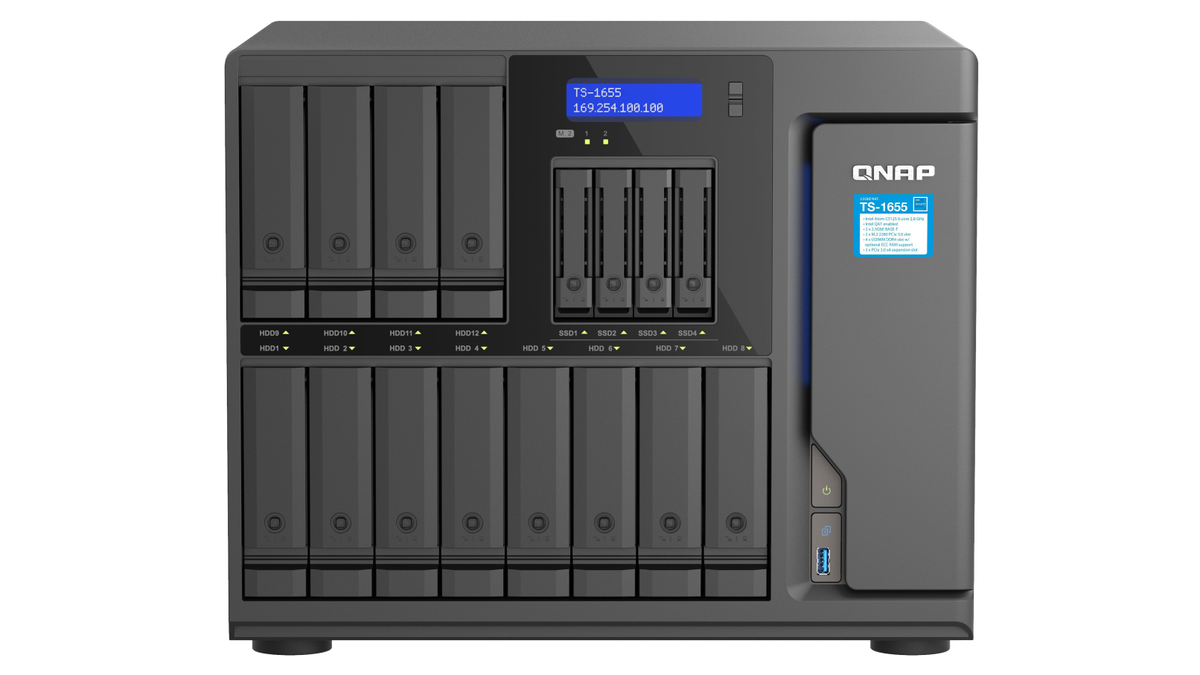Qnap TS-855eU-RP review: Ideal for space-poor SMBs
This short-depth rack NAS provides big storage in a small space and delivers strong performance

-
+
Strong data integrity and protection
-
+
Excellent NAS performance over 10GbE

The Qnap TS-855eU-RP aims to show that good things come in small packages as it squeezes eight 3.5in SATA drive bays into a chassis that's only 297mm deep. This makes it one of the shortest 2U rack NAS devices on the market and makes it ideal for slotting into a small wall box or a two-post rack cabinet.
More Qnap reviews

The appliance is powered by a reasonably modern 2.8GHz 8-core Intel Atom C5125 processor, and the base 8GB of DDR4 RAM can be upgraded to 64GB. Dual 2.5GbE ports are provided along with a pair of PCI-E expansion slots and, even though the motherboard is barely 12cm deep, Qnap has found room to add a couple of M.2 NVMe slots.
The lack of an "H" in the model name indicates that Qnap is aiming the Qnap TS-855eU-RP primarily at businesses that prefer its more nimble QTS operating system. The setup wizard offers an option to install QuTS hero, but that's a lot more memory-hungry so you'll need to upgrade the memory to at least 16GB to get the best out of it.
Qnap TS-855eU-RP review: Performance
For testing, we decided to go with QuTS and used dual mirrored 480GB Kingston M.2 NVMe SSDs as a fast system pool. For data storage, we fitted four 20TB Western Digital DC HC560 hard disks, although when we configured them as a 53TB RAID5 array, QuTS complained about insufficient memory so we upgraded this to 16GB.
If data integrity and protection are top priorities then QuTS is your best bet as it offers a lot more features than QTS. These include end-to-end checksums, ZFS copy-on-write for fast, near unlimited snapshots, triple mirroring and triple parity RAID, plus WORM (write once read many) policies for protecting NAS share data from tampering or unauthorised deletion.
App choices are very similar. Qnap offers around 120 apps for both OSes, with all key backup apps present and correct. These include Qsync for protecting PC, macOS, Android, and iOS end-user devices, and Hybrid Backup Sync 3 for on-appliance data backup and syncing to remote servers.
Remote replication is deftly handled by the SnapSync app, which provides fast snapshot backups to remote QuTS appliances using block-level replication run to a schedule or in real time. The free Hyper Data Protector is great for backing up virtualized environments, and we had no problems using it to create scheduled jobs for selected virtual machines (VMs) on our Hyper-V and VMware vSphere hosts.
Sign up today and you will receive a free copy of our Future Focus 2025 report - the leading guidance on AI, cybersecurity and other IT challenges as per 700+ senior executives
For performance testing, we fitted a standard Broadcom dual-port fibre 10GbE card, which was accepted without any problems. It's worth noting that Synology's short-depth RS1221+ rack NAS is only certified for the company's own-brand NICs and storage devices.
NAS performance over 10GbE is excellent, with a share mapped to a Dell T640 Windows Server 2019 host returning Iometer sequential read and write rates both of 9.3Gbits/sec, while random rates panned out at 9.3Gbits/sec and 9.1Gbits/sec. The last two numbers highlight another QuTS advantage: its efficient ARC (adaptive read cache) and ZIL (ZFS intent log) features do away with the need for SSD caches.
Real-world performance is great: copies of a 25GB test file between the NAS and server averaged read and write rates of 8Gbits/sec and 9.1Gbits/sec, while our backup test using a 22.4GB folder with 10,500 files was secured to the share at an average of 2.4Gbits/sec.
IP SAN performance over 10GbE is a mixed bag, with a 1TB iSCSI target delivering read and write rates both of 9.2Gbits/sec. Increasing the pressure with a dual 10GbE MPIO link to the target saw only modest improvements to 13.9Gbits/sec and 10Gbits/sec.
You'll need to double the base memory to run QuTS hero, but the Qnap TS-855eU-RP is ideal for space-poor SMBs as it packs a high storage density into a remarkably small and very quiet rack chassis. It delivers good 10GbE performance and offers an incredible range of business apps for both OSes, with a sharp focus on data protection.
Dave is an IT consultant and freelance journalist specialising in hands-on reviews of computer networking products covering all market sectors from small businesses to enterprises. Founder of Binary Testing Ltd – the UK’s premier independent network testing laboratory - Dave has over 45 years of experience in the IT industry.
Dave has produced many thousands of in-depth business networking product reviews from his lab which have been reproduced globally. Writing for ITPro and its sister title, PC Pro, he covers all areas of business IT infrastructure, including servers, storage, network security, data protection, cloud, infrastructure and services.
-
 Hackers are using LLMs to generate malicious JavaScript in real time – and they’re going after web browsers
Hackers are using LLMs to generate malicious JavaScript in real time – and they’re going after web browsersNews Defenders advised to use runtime behavioral analysis to detect and block malicious activity at the point of execution, directly within the browser
By Emma Woollacott Published
-
 AI coding is taking off in the US – but developers in another country are “catching up fast”
AI coding is taking off in the US – but developers in another country are “catching up fast”News Developers in the United States are leading the world in AI coding practices, at least for now
By Nicole Kobie Published
-
 Veeam ramps up growth plans with trio of leadership hires
Veeam ramps up growth plans with trio of leadership hiresNews The data resilience vendor has reshaped its senior leadership team to deepen partner engagement and streamline customer success in the AI era
By Daniel Todd Published
